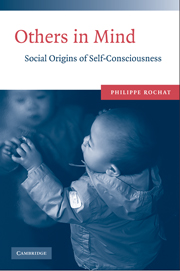Book contents
- Frontmatter
- Contents
- Foreword by Jerôme Bruner
- Preface
- Introduction: Main Ideas
- 1 Self-Conscious Species
- 2 Six Propositions
- 3 Varieties of Self-Reflective Mind State
- 4 Mind States in Development
- 5 Birth of Self-Consciousness
- 6 Shame and Self-Knowledge
- 7 The Roots of Guilt
- 8 Giving and Sharing
- 9 Origins of Owning and Sharing
- 10 Social Construction of Identity
- Conclusion: Moral Space and the Self
- Postscript Note
- References
- Index
3 - Varieties of Self-Reflective Mind State
Published online by Cambridge University Press: 05 August 2012
- Frontmatter
- Contents
- Foreword by Jerôme Bruner
- Preface
- Introduction: Main Ideas
- 1 Self-Conscious Species
- 2 Six Propositions
- 3 Varieties of Self-Reflective Mind State
- 4 Mind States in Development
- 5 Birth of Self-Consciousness
- 6 Shame and Self-Knowledge
- 7 The Roots of Guilt
- 8 Giving and Sharing
- 9 Origins of Owning and Sharing
- 10 Social Construction of Identity
- Conclusion: Moral Space and the Self
- Postscript Note
- References
- Index
Summary
For many scientists, consciousness is the “C” word. They avoid it like the plague because it is semantically loose, a concept that covers too much. Consciousness is indeed a general term with as many meanings attached to it as there are theories about it. It has been debated for centuries in the tradition of Western philosophy, and the debate continues in the recent wave of cognitive and neuroscience research.
This chapter is an attempt at some clarification regarding the “C” word. I propose a distinction among various states of our self-reflecting mind. These states are construed as forming the variety of mental contexts of our experience of the world in general, and in particular of our experience of the self in relation to others.
The proposed distinction starts with the dichotomy between conscious and non-conscious states. It continues with distinctions among awareness, co-awareness, consciousness, and finally co-consciousness that define the social aspect of knowledge and self-knowledge in particular.
Beyond term clarification, what is proposed here is useful when considering the developmental origins of self-consciousness (see the following chapter). It provides a conceptual tool in the articulation of changes and qualitative shifts that mark the emergence of self-knowledge in human ontogeny.
As a cautionary note, this presentation does not pretend to be a lesson in philosophy of mind. It is the product of a reflection in the context of experimental research that tries to elucidate fundamental “C” questions in the perspective of early development such as, Are infants born conscious? What characterizes newborns' states of awareness?
- Type
- Chapter
- Information
- Others in MindSocial Origins of Self-Consciousness, pp. 43 - 60Publisher: Cambridge University PressPrint publication year: 2009



